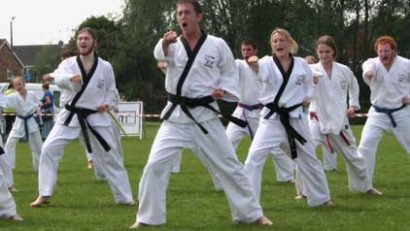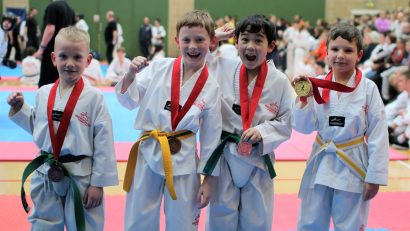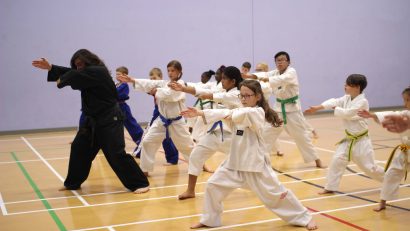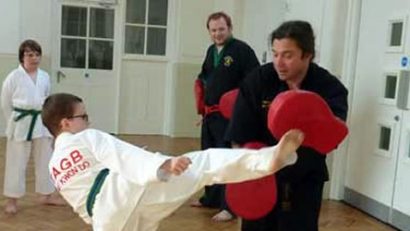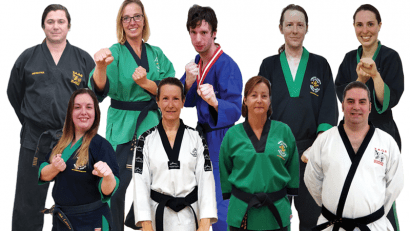Below are some fundamental theories which should be understood (and ultimately remembered!) by all those studying TaeKwon-Do.
What is Tae Kwon-Do?
TaeKwon-Do is a martial art which was developed in South Korea. It is based on older forms of unarmed (not using any weapons) fighting for self-defence practiced for many centuries in the orient. Translated from Korean, TaeKwon-Do means ‘The Way of the Foot and Hand’ – referring to kicking and punching.
The History of Tae Kwon-Do
Tae Kwon-Do was inaugurated in South Korea on April 11th 1955 following extensive research and development by the founder Major General Choi Hong Hi, 9th Degree Black Belt (9 November 1918 – 15 June 2002).
Taekwon-do was introduced into the United Kingdom in 1967.
For a more in depth history, please refer to our Student Handbook.
The Tenets of Tae Kwon-Do
The tenets of TaeKwon-Do play a huge role in the success of ones TaeKwon-Do training. And serious student of the art should observe and implement the tenets to the best of their ability.
COURTESY: To be polite to everyone. You must always be courteous to your instructors, seniors, fellow students and indeed, everyone.
INTEGRITY: To be honest and trustworthy. The quality of being honest and having strong moral principles.
PERSEVERANCE: To persist despite difficulty. Whether achieving a higher grade or a new technique, you should never stop trying. This also applies to all endeavours in life.
SELF CONTROL: To always be in control of your actions. You should attempt to control yourself, in particular your emotions and desires, especially in difficult situations.
INDOMITABLE SPIRIT: To show strength of spirit when you and your principles are pitted against overwhelming odds. You may be beaten but your warrior spirit remains strong – it cannot be dominated.
Student Oath
I shall observe the tenets of TaeKwon-Do.
I shall respect the Instructors and seniors.
I will never misuse TaeKwon-Do.
I shall be a champion of freedom and justice.
I shall build a more peaceful world.
Conduct in the Dojang
Every student must observe the following conduct in the Dojang in order to maintain an orderly and effective training class.
When coming into the Dojang, you should bow to show your respect to the Dojang, the Instructor, your fellow students and the art of TaeKwon-Do.
When the Instructor calls for the class to line up, you should do so quickly and silently. There will be a formal bowing ritual at the start of the class.
Once the Instructor calls upon the class to line up, you should stop talking and remain silent. There should be no casual talking during a TaeKwon-Do class. If you wish to ask a question, raise your hand. A senior grade student working with a lower grade may talk quietly with that student to help them. A junior grade student working with a senior grade must ask formally for help from the senior student. Casual conversations during class are unacceptable.
Once the class has commenced, it is unacceptable to either casually help yourself to a drink or leave the Dojang for any reason without the Instructor’s permission, unless in an emergency. On a practical level—your Instructor is responsible for your health and safety and needs to be aware of where you are.
At the end of the class there will be a formal bowing and dismissal ritual—do not leave until you are formally dismissed.
Take all of your belongings and equipment home with you and DO NOT leave rubbish behind.
When you leave, turn and bow into the Dojang, for the same reasons that you bowed when you came in.
Rules
- All students must complete and sign the relevant membership application forms prior to commencing training.
- All students must have applied and paid for their yearly licence after their first four weeks training.
- Subscriptions must be paid by the 15th of every month. Failure to do so will incur a penalty fee.
- The build up of arrears is NOT ACCEPTABLE.
- Attendance—students should achieve at least 75% attendance, based on training twice a week as 100%. Less than 75% attendance will either double your grading time or disqualify you from grading altogether.
- Avoid arriving late to a class if at all possible, it is traditional for the Instructor to give a late arriving students 10 press-ups for every minute that they are late, unless the late arrival has been authorised prior to the lesson.
- If the Instructor is late, a qualified Instructor or the most competent student present should commence training sessions promptly until the Instructor arrives.
- An Instructor approved dobok must be worn during training in the Dojang. The wearing of tracksuits or other clothing is not permitted, unless prior permission has been obtained from the Instructor.
- A full set of sparring equipment is required by 5th kup grade. All kit must be purchased from your instructor. The only kit acceptable is badged ITC; we will continue to accept TAGB equipment for now. If you intend to source this from Ebay, please check with your instructor that it is the correct equipment.
- Suits (doboks) should be clean and ironed for each training session.
- No smoking, eating or wearing of jewellery (rings etc.) is permitted during training.
- NO SMOKING is permitted whilst wearing a dobok, regardless of the place. (Dojang, tournament, demonstration etc.).
- Your belt should be removed if eating or drinking whilst you are wearing your dobok (at the discretion of the Instructor).
- Finger and toe nails must be kept short.
- Long hair should be tied back.
- Where appropriate to the grade, sparring equipment should be brought to every lesson.
- Entry into gradings will depend on a student’s attitude, attendance and the Instructor’s discretion, as well as technical ability.


